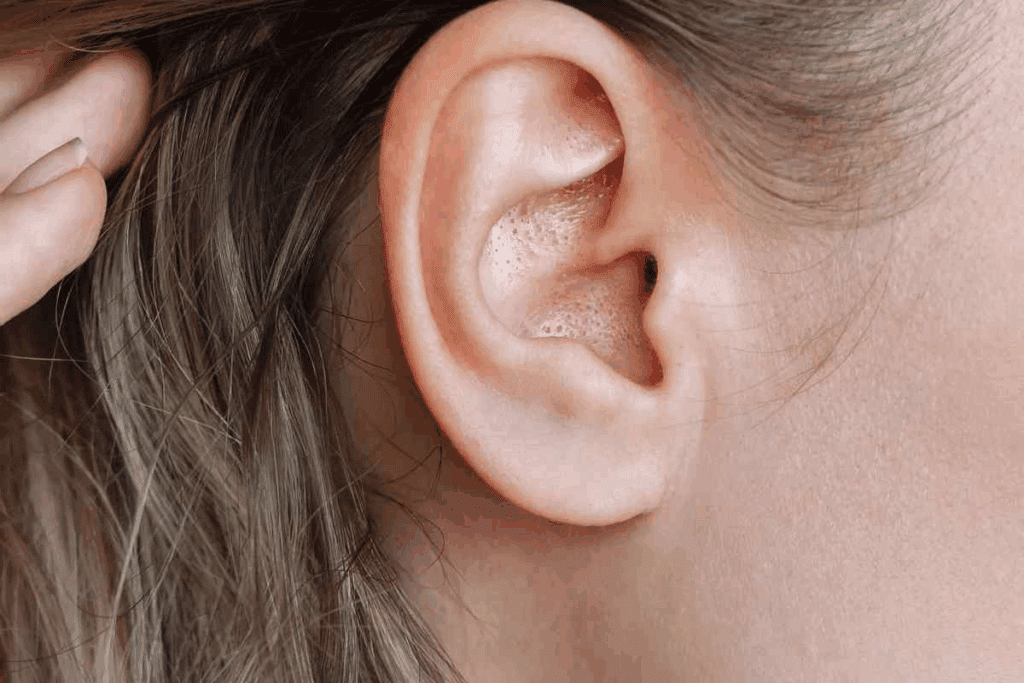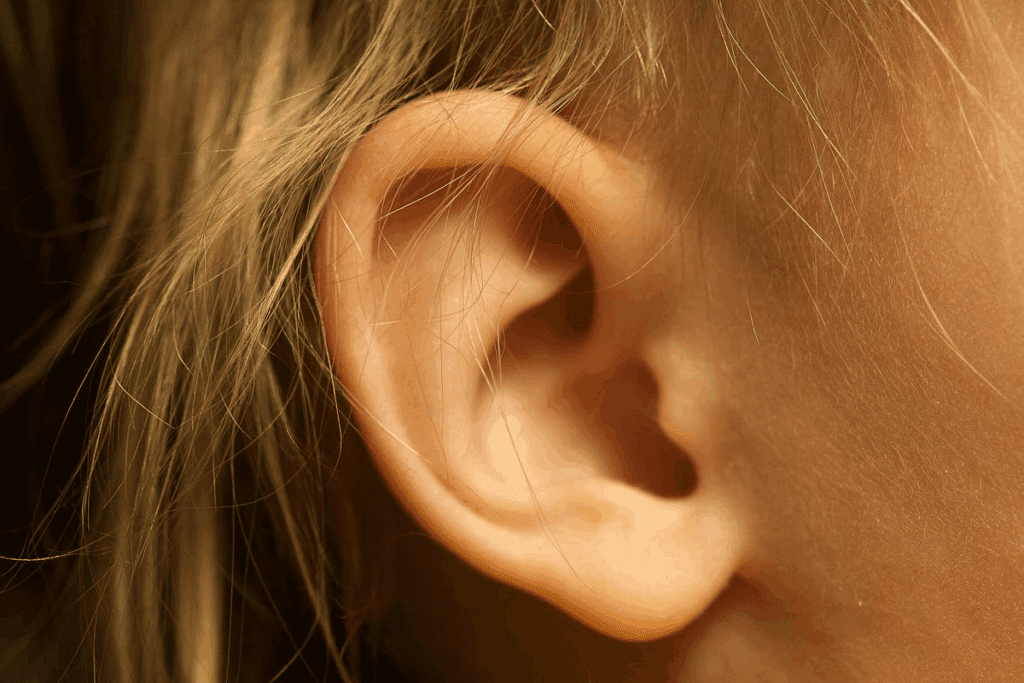
How to relieve a burning sensation inside ear, looking at causes like ear infections, dryness, or irritation of the ear canal.
Feeling a burning sensation inside your ear can be really uncomfortable. It can happen to anyone, no matter their age or background. People often describe it as feeling warm, hot, or uncomfortable inside or around their ear.
Many things can cause this feeling, like infections, the environment, and skin issues. At Liv Hospital, we know how important it is to deal with this problem. We use international medical standards and focus on the patient to help.
It’s key to know what’s causing the ear burning sensations to find the right treatment. We’ll look at the common reasons and how to manage them.
Key Takeaways
- Ear burning sensation can result from various factors, including infections and environmental exposures.
- Understanding the cause is key to finding relief.
- Liv Hospital offers expert otologic care with a patient-centered approach.
- International medical standards are used to address ear-related discomfort.
- Relief options are available based on the underlying cause of the burning sensation.
Understanding the Burning Sensation Inside Ear

Feeling a burning sensation in your ear can be really uncomfortable. Knowing what causes it is the first step to feeling better. The ear is a complex organ with many parts, and different things can make it feel like it’s burning.
Anatomy of the Ear and Pain Receptors
The ear has three main parts: the outer ear, middle ear, and inner ear. Each part does something different and can be affected by different things. The outer ear catches sound, the middle ear sends it to the inner ear, and the inner ear turns it into signals for the brain.
Pain receptors are all over the ear. When these receptors get irritated, it can feel like burning. The outer ear is more likely to get infections and irritations, like otitis externa, or swimmer’s ear. This happens when water gets into the ear canal and creates a moist place for bacteria or fungus to grow.
The middle ear can also hurt, often because of infections like otitis media. These infections can cause a lot of pain and affect your hearing.
Differentiating Between Types of Ear Discomfort
It’s important to know the difference between different kinds of ear pain. Ear canal burning can feel like sharp pain, dull ache, or burning. Knowing if the pain is always there or comes and goes, and if you have other symptoms like itching or discharge, can help figure out what’s wrong.
Many things can cause ear burning, like infections, things in the environment, and skin problems. By knowing what your ear pain is like, you can take steps to make it better. We’ll look at these causes in more detail later, so you can understand how to deal with the burning in your ear.
Common Causes of Ear Burning Sensations

Ear burning sensations can come from many sources, like infections or environmental factors. Knowing what causes them helps find the right treatment.
Infections That Cause Burning
Infections are a big reason for ear burning. Otitis externa, or swimmer’s ear, is an infection of the outer ear canal. It happens when bacteria or fungi grow there, often because of moisture or injury. Otitis media affects the middle ear, causing pain and sometimes a burning feeling.
Studies show that bacterial or viral infections are a big part of ear burning cases. We’ll look at how to treat these infections next.
Skin Conditions Affecting the Ear
Skin issues like seborrheic dermatitis, eczema, and contact dermatitis can also cause ear burning. These conditions make the ear inflamed and irritated, leading to a warm or burning feeling.
It’s important to know which skin condition is causing the problem to treat it right. We’ll talk about treatment options later.
Environmental Factors
Environmental factors also play a big part in ear burning. Extreme temperatures, sunburn, and allergens can all cause discomfort. For example, sunburn on the outer ear can make it feel like it’s burning.
Learning how to protect our ears from these factors is important to avoid future discomfort.
Psychological Factors
Stress and emotional responses can also lead to ear burning. Stress can make blood vessels expand, causing a warm or burning feeling.
Reducing stress through relaxation and emotional well-being can help with ear burning caused by stress.
Identifying Symptoms Associated with Burning Ears
To tackle the problem of a burning ear, we must look at all symptoms. A burning sensation in ear is not just about the pain. Other symptoms can hint at what’s really going on.
Physical Symptoms to Watch For
Physical signs can be different for everyone. They might include redness, swelling, and pain in or around the ear. Sometimes, you might see a rash or discharge. These signs often point to an infection or skin issue causing the warm feeling in ear or burning pain inside ear.
It’s key to watch these symptoms closely. This helps us understand how serious they are and how long they last.
Accompanying Symptoms
Along with physical signs, there are other symptoms that can show up with a burning pain in ear. These might include fever, feeling tired, hearing loss, or tinnitus (ringing in the ears). These symptoms can help figure out what’s causing the ear burning.
If you have a fever with ear burning, it might mean you have an infection. This needs medical help.
Knowing and spotting these symptoms helps us find the cause of the burning sensation in ear. It’s important to notice any changes in symptoms. If they don’t get better or get worse, see a doctor.
Immediate Relief for Burning Sensation Inside Ear
To ease the burning in your ear, first figure out why it’s happening. Then, use the best ways to feel better. We’ll look at cool methods, pain relief you can buy, and how to sit or lie down.
Safe Cooling Methods
One easy fix is a cool compress. It cools the area and feels better right away. To do this safely, wrap an ice pack or a cold, damp cloth in a towel. Then, gently put it against your ear. Make sure not to let the ice pack touch your skin to avoid frostbite.
Over-the-Counter Pain Management
OTC pain meds can help with ear burning. Ibuprofen and acetaminophen are good choices. They cut down pain and swelling. But, always take the right amount and talk to a doctor if you’re not sure or if the pain doesn’t go away.
- Always read the label carefully
- Follow the recommended dosage
- Consult a healthcare professional if necessary
Positioning and Pressure Relief
Changing how you sit or lie down can help. If you’re feeling pain from being at a high place or from a cold, try tilting your head or lying on the other side. Also, ear drops or adjusting your earbuds can ease pressure.
Trying these methods can help you feel better. But, if the pain keeps coming back, see a doctor to find out why and get the right treatment.
Home Remedies for Ear Canal Burning
A burning sensation in the ear can be annoying. Luckily, there are many home remedies to help ease it. These can be used along with quick fixes for lasting comfort.
Natural Oils and Drops
Natural oils and drops are great for ear canal burning. Here are some top picks:
- Olive Oil: It moisturizes and soothes the ear canal.
- Garlic Oil: Garlic fights infections with its antimicrobial properties.
- Tea Tree Oil: Diluted tea tree oil reduces inflammation and fights infection.
To use these oils, warm them by placing the bottle in hot water. Then, use a dropper to put a few drops in your ear.
Herbal Solutions
Herbal remedies have been used for ages to treat ear issues. Here are some effective ones:
- Ginger: Ginger reduces swelling and eases pain with its anti-inflammatory properties.
- Chamomile: Chamomile calms the ear canal with its soothing effects.
Make a tea by steeping ginger or chamomile flowers in hot water. Cool it down and use it as ear drops.
Hydration and Diet Modifications
Ear canal burning might signal dehydration or a nutritional gap. Drinking enough water and adjusting your diet can help.
Dietary Change | Benefit |
Increasing water intake | Keeps ears and body healthy |
Consuming foods rich in omega-3 fatty acids | Lessens inflammation |
Avoiding spicy or acidic foods | Reduces irritation |
Adding these home remedies to your routine can ease ear canal burning. But, if it doesn’t go away, see a doctor.
Medical Treatments for Burning Sensation Inside Ear
The burning sensation inside the ear can be really tough to deal with. But, there are medical ways to help. If home remedies don’t work, it’s time to see a doctor to find out why your ears are burning.
Prescription Medications
If an infection is causing the burning, prescription medications like antibiotics or antivirals might be needed. These can fight the infection and make the burning go away. It’s important to take all the medicine your doctor prescribes to get rid of the infection completely.
Anti-inflammatory Treatments
When inflammation is the main problem, anti-inflammatory treatments can really help. Corticosteroids, for example, can reduce swelling and ease the burning. These are often used for conditions like eczema that affect the ear.
Antifungal Treatments
Fungal infections can also make your ear feel warm. For these, antifungal treatments are needed. You might take medicine by mouth or apply it to your ear, depending on the infection. It’s key to know what kind of fungus you have to get the right treatment.
Seeing a doctor and following their advice can lead to effective treatments for ear burning. Medical care can offer lasting relief and prevent future problems by tackling the cause.
Addressing Chemical Irritants Causing Ear Burning
It’s important to find and fix chemical irritants to stop ear burning. These irritants can be in hair products, pool water, and some air we breathe.
Identifying Common Irritants
Some common irritants that cause ear burning are:
- Hair care products with harsh chemicals
- Pool chlorine and other swimming pool disinfectants
- Certain metals and dyes in jewelry or clothes
- Industrial chemicals at work
A medical expert says, “Chemical exposure is a big reason for ear burning, and finding the irritant is the first step to feeling better.”
“The key to managing ear burning caused by chemical irritants lies in understanding the source of exposure and taking appropriate measures to avoid it.”
– Medical Expert
Removal and Treatment Strategies
After finding the irritant, the next step is to get rid of it. This means:
- Staying away from harsh hair care products
- Wearing ear protection when swimming in chlorinated pools
- Using protective gear at work
Effective removal strategies can really help lessen ear burning. Sometimes, you might need medical help to feel better.
Prevention Strategies
Stopping chemical irritants before they start is key to avoiding ear burning. You can do this by:
- Using gentle, chemical-free hair care products
- Wearing earplugs when swimming
- Following safety rules at work
By using these prevention strategies, you can lower your chance of getting ear burning from chemical irritants.
Preventing Recurring Burning Sensation Inside Ear
Keeping your ears healthy is key to avoiding burning sensations. Simple habits can help a lot. By following these tips, you can lower your risk of ear discomfort.
Proper Ear Hygiene Practices
Good ear hygiene is the first step. Don’t put things in your ear canal. This can push wax in and cause problems. Instead, clean the outer ear with a washcloth and let the ear canal clean itself.
Choose gentle ear cleaning products. Look for ones made for ear care and without harsh chemicals. Also, avoid using cotton swabs (Q-tips) to prevent damage to your ear canal or eardrum.
Environmental Protections
Protecting your ears from loud noises is important. When in loud places, wear ear protection like earplugs. This keeps your hearing safe and prevents irritation.
Also, watch out for the sun’s effects on your ears. Use sunscreen or ear protection with a UPF rating to avoid sunburn. Sunburn on the outer ear can lead to burning inside the ear.
Lifestyle Adjustments
Changing your lifestyle can also help. Stress can make your ears uncomfortable. Try relaxation methods like meditation or deep breathing to reduce stress.
Stay away from things that make you allergic. If you have allergies, try to avoid things that trigger them. Use hypoallergenic products to lower the chance of an allergic reaction in your ears.
By following these tips, you can keep your ears healthy and avoid future problems. If you have ongoing or severe ear burning, see a doctor for help.
When to Seek Medical Help for Ear Burning
If you feel a burning sensation in your ear, knowing when to see a doctor is key. Many cases can be treated at home. But, some need professional help.
Warning Signs That Require Immediate Attention
Some symptoms with ear burning need quick doctor visits. These include:
- Severe pain: If the pain is intense or getting worse.
- Fever: Fever might mean an infection.
- Discharge or bleeding: Unusual discharge or bleeding from the ear.
- Hearing loss: Sudden or big hearing loss.
- Dizziness or vertigo: Feeling dizzy or having vertigo.
Spotting these signs early helps get the right care fast.
What to Expect During Medical Examination
At your doctor’s visit, expect a detailed check-up. This might include:
Examination Component | Description |
Medical History | Talking about your symptoms, health history, and recent irritant exposures. |
Otoscopy | Using an otoscope to look at the ear canal and eardrum. |
Hearing Tests | Doing hearing tests if hearing loss is a concern. |
Follow-up Care
After your first visit and diagnosis, you might need follow-up care. This could be treatment for underlying issues, advice on managing symptoms, or more tests. Following your care plan is important for managing your ear burning.
Knowing when to get medical help and what to expect at your visit helps you tackle ear burning. It also keeps your ears healthy.
Special Considerations for Different Age Groups
Burning in the ear can happen to anyone, at any age. It’s important to know how it affects different people. The reasons, effects, and ways to treat it vary by age.
Children and Ear Burning Sensations
Children often get ear infections, which can feel like burning. Their Eustachian tubes are shorter and more open, making it easier for germs to get in. We need to watch for signs like pulling at the ear, fever, or crankiness, and get help fast.
- Monitor for signs of ear infections
- Ensure proper ear hygiene
- Consult a pediatrician for appropriate diagnosis and treatment
Teaching kids not to put things in their ears is also key. It helps prevent damage and infections.
Elderly Patients and Ear Discomfort
Older people might feel burning in their ears due to dry skin or hearing loss. They can also get more earwax, which can hurt and affect their hearing.
It’s a good idea for seniors to get their ears checked often. Using ear drops for dry ears can also help with discomfort.
“Age-related changes can significantly impact ear health, making regular check-ups critical for seniors.”
— Medical Expert, ENT Specialist
Pregnancy and Ear Issues
Pregnancy can make ears feel different due to hormonal changes. Fluid buildup can also mess with the Eustachian tube, leading to pain or discomfort.
If you’re pregnant and have ear pain, tell your doctor. Drinking water and managing allergies can help with some ear problems during pregnancy.
Knowing how age affects ear burning is key to better care. By understanding the unique challenges of each age group, we can offer more tailored help and relief.
Conclusion
Knowing why your ears burn is key to feeling better. We’ve looked at many reasons, like infections, the environment, and skin issues. Finding out what’s causing your ear pain helps you pick the right treatment.
There are many ways to ease ear pain, from quick fixes to medical care and ways to prevent it. Using this knowledge can keep your ears healthy and lessen ear burning. We suggest using this info to take care of your ears and get help when you need it.
By being proactive, you can stop ear burning and feel better overall. We’re here to give you the info and support you need for your ear health.
FAQ
What are the common causes of a burning sensation inside the ear?
Common causes include infections like otitis externa and otitis media. Skin conditions like seborrheic dermatitis, eczema, and contact dermatitis also cause it. Environmental factors and stress can play a role too.
How can I identify the symptoms associated with burning ears?
Look for redness, swelling, and pain in your ears. Also, watch for fever, fatigue, hearing loss, and tinnitus.
What are some immediate relief options for a burning sensation inside the ear?
For quick relief, try a cool compress or over-the-counter pain meds like ibuprofen or acetaminophen. Adjusting your position or using ear drops can also help.
Are there any home remedies that can help alleviate ear burning sensations?
Yes, natural oils and drops like olive oil or garlic oil can help. Herbal solutions like ginger or chamomile also work. Drinking plenty of water and changing your diet can also help.
When should I seek medical help for a burning sensation inside my ear?
If you have severe pain, fever, or discharge, seek medical help right away. A doctor can diagnose and treat your condition.
How can I prevent recurring burning sensations inside my ear?
Keep your ears clean and avoid loud noises or harsh chemicals. Manage stress and avoid allergens to prevent future issues.
Can chemical irritants cause ear burning sensations, and how can I address them?
Yes, chemicals like hair care products or pool chlorine can irritate your ears. Avoid exposure and use gentle products or ear protection.
Are there any special considerations for different age groups when it comes to ear burning sensations?
Yes, age can affect ear health. Children are more prone to infections, while older adults may experience hearing loss. Pregnant women may also notice changes in their ears.
What medical treatments are available for burning sensations inside the ear?
Treatments include antibiotics, antivirals, anti-inflammatory treatments, and antifungals. Your doctor will recommend the best option for you.
How can I manage ear burning sensations caused by infections?
To manage infections, see a doctor and follow their treatment plan. This may include prescription meds or other interventions.
References
National Center for Biotechnology Information. (2025). How to Relieve Burning Sensation Inside Your Ear. Retrieved from https://www.ncbi.nlm.nih.gov/books/NBK470320/

































